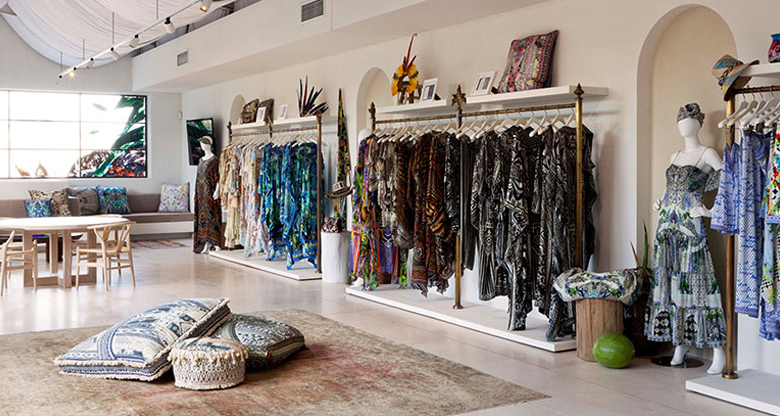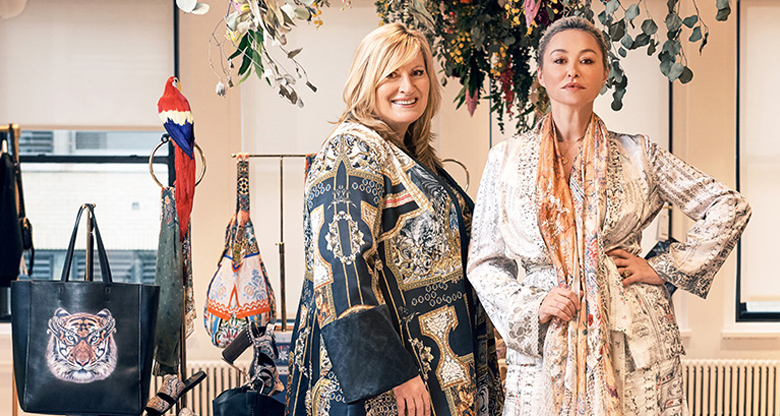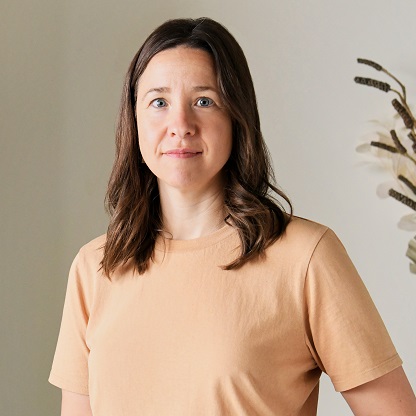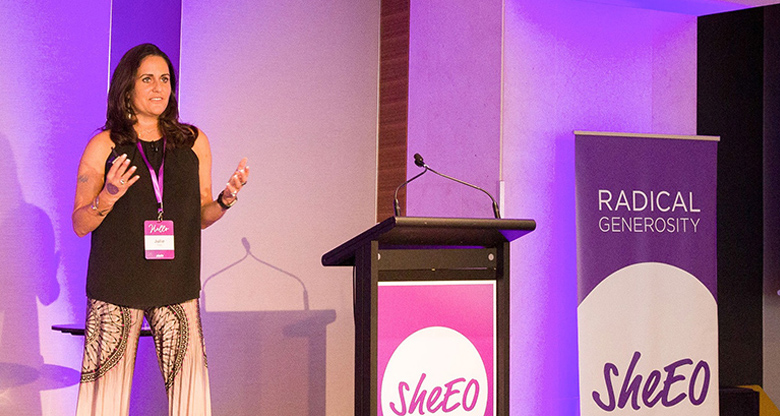When CommBank surveyed retailers across Australia in January 2020, the goal was to understand what makes strong retailers different, and three factors stood out. Over the past five years, stronger retailers were those with financial flexibility, agility and an engaged team.
For Jane McNally and the team at Camilla, these qualities are now even more important. The need to keep up with a changing marketplace and build the businesses’ “infrastructure for growth” is crucial to deliver Camilla’s vision – to Colour the World.
Standing out from the crowd
Jane has a storied career in fashion and years of experience as Chief Executive Officer. But she was particularly drawn to Camilla’s unique market position. She now works alongside founder and creative director, Camilla Franks, to produce what Jane describes as ‘wearable art’.
And Jane says that as consumer tastes have changed post-COVID-19, it has been the label’s unique style and the ability to move quickly that has kept it relevant.
“At the beginning of lockdown, we accelerated the launch of our Zen Wear range - a relaxed activewear - and it sold out in two weeks. We launched it from concept within 10 weeks, which is almost unheard of for a luxury designer.”
“We’re also seeing career customers who want to make a great impression on video conferencing calls. We have a unique style that is perfectly suited for above the desk impact. With some people feeling a little locked up, owning a feel-good brand that’s about colour and vibrancy, that speaks to a little escapism, has become more important and beneficial for our customers sense of well being.”
 Image source: supplied. Villa CAMILLA.
Image source: supplied. Villa CAMILLA.
The foundations for agility
Jane explains that well before COVID-19 arrived, she was working hard to ensure the business increased its flexibility. That meant reshaping processes, staying close to partners and trying new ways of working.
“Before COVID-19, the business was split equally between online, in-store and wholesale channels,” Jane says. “Now it’s about 50% online, and all channels are more responsive.”
“Every garment we produce is individually printed, which is a complicated manufacturing process. But we reworked our design and production methods and have very close relationships with our manufacturers. We can now get something new to market far more quickly than ever before.”
Jane says Camilla is also rethinking the way it grows into new markets and how they reach customers, a strategy that has come into sharper focus amid the pandemic. This involves testing the market before committing to a permanent presence and remaining open to different channels.
“Historically, we would enter the market via a prestigious physical retailer and would then launch online shipping or an online store. Finally, we would open our boutiques, to showcase Camilla in its full glory, which in turn would boost the other channels.”
“Now, we can’t bank on a long lease life, and with many more digitally savvy customers, we are starting to offer online first. We are also opening less investment-heavy pop-up stores rather than full boutiques to test a market. For example we just wrapped our new Bondi Junction pop-up from floor to ceiling in eye-catching Camilla wallpaper, and that has immediately become our second-best performing store.”
 Image source: supplied. In store at Camilla, Bondi Junction Sydney.
Image source: supplied. In store at Camilla, Bondi Junction Sydney.
Taking the in-store experience online
Before the pandemic, clothing and footwear consumers were already shopping more online. CommBank research from January shows that 60% of shoppers had increased their online shopping compared to five years ago. That has picked up in recent months.
According to Jane, Camilla’s online sales jumped 100% in Australia during July 2020 from a mature base. To grow its global presence, Camilla is also building on wholesale relationships with pure-play online retailers to strike up marketplace arrangements that can help extend its reach.
“And navigating an even bigger big shift to online means we are doing a lot of things differently,” Jane says. There are the hygiene factors like an exciting website, speed of delivery and ease of checkout, but for our brand you also need human interaction and connectivity.”
As Jane highlights, Camilla is a brand that likes to engage all the senses with customers typically spending more than an hour in stores, so replicating that full experience online is a challenge.
“If you physically enter one of our boutiques, not only do you touch and feel the garments, but we offer very personal customer service from our ‘Camilla Angels’ – including fragranced oils and champagne .”
“So, where there has been a store lockdown in place, we have harnessed all our Angel power. Their usual store roster has become a customer roster within which they support online appointments. In Victoria, we have triangular appointments with the customer, their local angel and an angel in the Sydney showroom who can show and talk through the garments. It’s a personal touch but within a digital environment.”
Jane says that even though Camilla has had some strong recent sales success, working through store closures and cancelled wholesale orders due to the pandemic was tough. She says it’s because of her team’s positive approach that the business has remained resilient and offers some advice to other retailers looking for support.
- Don’t be frightened. Test small and enlarge quickly if you see things are working.
- Hire good people. You can never go wrong with an outstanding team.
- Learn from the best. Investigate what others are doing online and create an innovation wish list that’s aligned to your budget. (Start with Amazon)
- Maintain strong partnerships. Maintain open communication with business partners and keep them close.
- Talk to others. There are good industry networks that can help, like the ARA and NORA.
Sign up to the Women in Focus newsletter for updates on our community and events, and more content like this.







